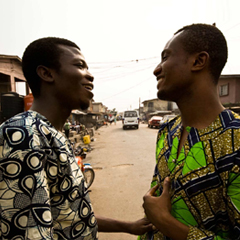Kole Shettima and Erin Sines, Co-Directors, On Nigeria, discuss how MacArthur’s three decades in Nigeria created trusting relationships and enabled progress against corruption, and they share learnings from grantee partners as they look to the future.
In late 2024, the Foundation celebrated the 30th anniversary of its Nigeria office. Over those three decades, we have supported many individuals, civil society organizations, academic institutions, faith-based organizations, and government entities to improve maternal and reproductive health, promote and protect human rights, advance girls’ education, promote accountability, and reduce corruption.
In 2024 we also marked the final year of the On Nigeria Big Bet program. Our team, grantee partners, and advisors have spent the last year (and will spend the coming year) consolidating our achievements, reflecting on what we learned along the way, and planning for the future.
As one notable example of our progress, when we launched On Nigeria in 2016, five states and the Federal Capital Territory (FCT) had adopted the 2015 Administration of Criminal Justice Act (ACJA). The ACJA was the cornerstone of our criminal justice reform efforts because it harmonized the justice sector, making it easier to investigate and prosecute corruption and other crimes. Today, all 36 states and the FTC have adopted the law, and many are consistently implementing the core components of it.
This is the only law in Nigeria’s history that has been fully domesticated, which is a remarkable achievement in only eight years. This accomplishment was possible because of the dedicated and visionary work of our grantee partners as well as a long-term investment by MacArthur and peer donors. Our program was fortunate to be able to build upon the efforts of our former Human Rights Program colleagues and grantee partners. Their work to strengthen the national legal and criminal justice architecture, by advocating for the reform of national laws set the stage for the eventual adoption of the ACJA, just as our program was launching. We owe them a debt of gratitude.
In the spirit of learning and in the hopes of encouraging others to build on our work, we offer a few reflections and look forward to sharing our learnings over the coming year.
In the spirit of learning and in the hopes of encouraging others to build on our work, we offer a few reflections and look forward to sharing our learnings over the coming year. For example, our ways of working—being Nigerian-led, collaborative, and committed to learning together—enhanced our efforts in ways that funding alone could not have achieved. We built trust-based relationships with our grantee partners by:
- engaging with them to create, adapt, and implement our strategy;
- by learning from and using evaluation data together;
- and by investing in skill building opportunities, defined by grantees.
In fact, cohorts of grantee partners working together to achieve common or complementary goals have been a powerful force of change.



